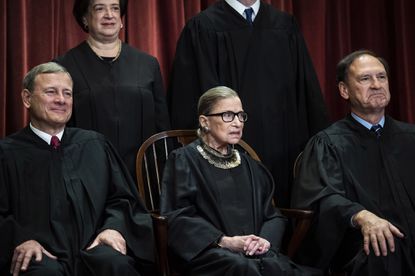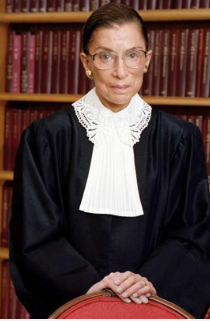Life and Legacy of Ruth Bader Ginsburg

Jabin Bostford / The Washington Post
Ruth Bader Ginsburg sitting while posing for a Supreme Court picture on Nov. 30, 2018.
October 5, 2020
Ruth Bader Ginsburg, a feminist icon, Supreme Court justice, and loving wife and mother, passed away on September 18, 2020 because of complications with pancreatic cancer. Ginsburg not only touched the lives of those working in government, but she touched the lives of most men and women working towards equality concerning gender. Ginsburg fought time and time again to break the gender barrier present in our nation; she represented many women in court. This country has not only lost a Supreme Court justice, but also a pioneer for equality in this generation.
Looking into Ginsburg’s life: she attended Cornell University on a full ride scholarship, where she met her husband Martin “Marty” Ginsburg. Later in their relationship, Ginsburg and her husband decided to move to Massachusetts and go to Harvard Law School. Out of 500 students, she was one of the 9 girls accepted into the law program During this time Marty Ginsburg was diagnosed with testicular cancer. Balancing law school, raising a child, and her husband’s illness Ruth Bader Ginsburg graduated top of her class.
Ruth Bader Ginsburg left her mark on the lives of people in this country. Andrew Merritt, the State High AP government teacher, was deeply saddened when he learned of her passing.

“She was so much more than the champion of women, she was the champion of the underdog. She was the voice for the voiceless,” Merritt said.
He, and many other people around the country, are afraid for what is to come surrounding her replacement. Ginsburg’s dying wish was to not fill in the spot until after the 2020 election.
Women’s rights have always been a subject up for debate ever since the founding of the United States. Many protests have been held throughout the years to move towards equality for women. In the 1970s, Ginsburg, in her late 30s, spoke to the Supreme Court to try and adopt a view of gender equality. She detailed her own experiences with discrimination and the effects on her to the court. Ginsburg was unsuccessful in making it official, the fight for gender equality is still going on.
In 2007’s Gonzales v. Carhart, Ginsburg defended the woman’s right to an abortion, writing in dissent, “The court deprives women of the right to make an autonomous choice, even at the expense of their safety. This way of thinking reflects ancient notions about women’s place in the family under the constitution–ideas have long since been discredited.” Abortion is still a controversial topic in the government. The idea of whether this right should be offered to women is often debated on. Ginsburg fought for the option to have an abortion, claiming it is the woman’s choice if she wants to bare a child or not.
Women around the country are worried for their rights as humans without Ginsburg’s influence in the Supreme Court. Women worry that rights that have taken years to establish will be revoked or repealed; such as the fight for equal pay and the right to birth control. Kathleen Volz, a senior at State High, worries for the future of American society. Volz has always admired Ginsburg not only for her opinions, but also because of how persistent Ginsburg was when fighting for equality.
“Her death leaves a gaping hole in society, and aside from the fact that I lost a role model, her death means terrible things for human rights, and I am worried about what will happen to my rights as a woman,” Volz detailed in an interview.
Ruth Bader Ginsburg fought for equality. A champion for women’s rights, she will forever be remembered by how much she has changed this country for the good.

